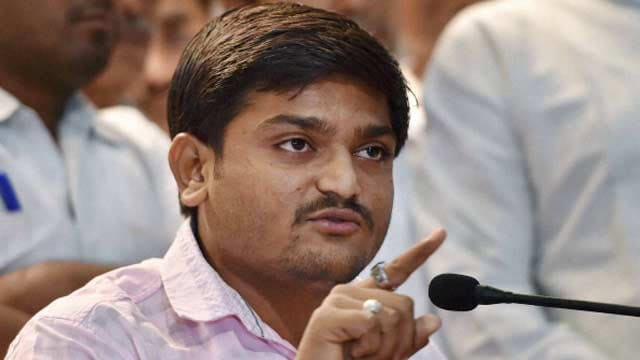By ABDUL HAFIZ LAKHANI:
With just a few weeks to go to the polls, the Patidars seem to have emerged as the tipping factors in the electoral see-saw of Gujarat.
The very community, Patels or Patidars, on whose shoulders the BJP rode piggyback through the decades In Gujarat has changed the complexion of state Assembly election with young and defiant leader Hardik patel announced to support Congress after long suspense.Patidar Anamat Andolan Samiti (PAAS) leader Hardik Patel has made his political preference clear for the upcoming state Assembly polls in Gujarat.
“I will not join any political party, but I will ask my supporters don’t vote for the BJP,” said the PAAS leader
It is a shot in the arm for the Congress as both PM Modi and president Shah are fighting to signal their absolute dominance over their home state after 22 years of uninterrupted BJP rule. The party has pulled out all the stops in Gujarat. Modi is visiting every week with fresh SOPs on each trip and dramatic denouncements of the Gandhi family and their “hatred for Gujarat and Gujaratis”.
The Congress has accepted Patidars’ demand for reservation, Patidar Anamat Andolan Samiti (PAAS) leader Hardik Patel said in Ahmedabad on Wednesday.“The Congress has agreed to give Patidars reservation under Section 31 and provisions of Section 46,” Mr. Patel told journalists. It has agreed to give Other Backward Classes (OBC) equivalent benefits to those not entitled to quotas in jobs and education.
Mr. Patel, however, refrained from pledging his support to the Congress. “Our primary goal is to get quota for Patidars and to achieve that, we first have to defeat the BJP,” he said.
who are patidars?
The Patidars are a dominant caste in Gujarat. They comprise only about 12.3 per cent of the state’s population. But they exert a disproportionate influence on Gujarat elections by virtue of their socio-economic status — much like the Marathas in Maharashtra. The Patidars are predominantly affluent. Of the 117 BJP MLAs in the Gujarat Assembly, 37 are Patels. Their grip on the state’s political scenario comes from their hold on Gujarat’s manufacturing sector.
However, experts say only 20 per cent of the Patidar population can be considered prosperous. Like the Sikh agitation in the 1980s, which assumed a religious colour, the Patidar agitation stems from the lack of jobs opportunities for the community’s youngsters and a stressed local economy.
What do the Patidars want?
In 1985, the Patidars launched a movement against reservation for the OBCs. This led to widespread conflict which claimed the lives of 100 people. In exactly thirty years, social dynamics in Gujarat seem to have gone back to square one.
Since those years, Gujarat has been through a variety of problems. Sebastian Morris, a professor at Indian Institute of Managment Ahmedabad, explains this in terms of the economic slowdown in Gujarat relative to the country’s economic growth. Between 1997 and 2002, for instance, Gujarat’s growth rate was slower than the national average, slightly lower than 3 per cent. In 2002, the state even flirted with negative growth. The Patidars, in particular, faced a crisis that was common to dominant farming communities across the country. Their farms shrunk and they were forced to move to the cities.
The discontent built up until 2015, when thousands of Patidar youngsters, crippled by the lack of jobs and a slow urban economy, hit the road in Mehsana demanding OBC status for their community, which would entitle Patidars to reservation in government jobs and education. The agitation found immediate resonance in the community and has been simmering ever since. The 2017 election is seen in the community as an opportunity to make their voice heard.
Who is Hardik Patel?
Hardik Patel is a 22-year-old newcomer to politics. In July 2015, his sister, Monica, failed to qualify for a state government scholarship and her friend from an OBC caste got the scholarship despite scoring lower marks. Although it may not have been the only trigger, Hardik formed the Patidar Anamat Andolan Samiti (PAAS) and launched an agitation for the inclusion of his community among social groups entitled to reservation.

